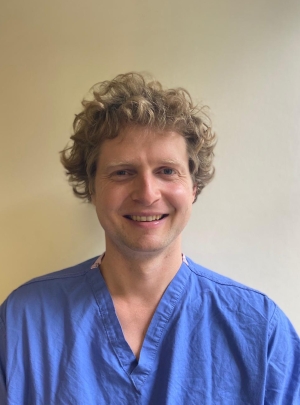14 November 2023
 Congratulations to Timothy Jenkins, specialist physiotherapist at Royal Brompton and Harefield hospitals, who has been awarded funding to conduct a pre-doctoral fellowship on lung muscle training for critical care patients.
Congratulations to Timothy Jenkins, specialist physiotherapist at Royal Brompton and Harefield hospitals, who has been awarded funding to conduct a pre-doctoral fellowship on lung muscle training for critical care patients.
The Pre-doctoral Clinical and Practitioner Academic Fellowship (PCAF) is funded by the Health Education England and the National Institute for Health and Care Research, offering individuals salaried time to develop a doctoral fellowship application and to undertake funded academic training.
This comes after Timothy successfully completed a fellowship funded by Royal Brompton & Harefield Hospitals Charity, a scheme which helped to develop staff in research skills, produce data and apply for further research funding – which Timothy successfully did.
With this new funding Timothy will have a year to gain further research experience and to undertake formal academic training and professional practice, all with the aim to develop a doctoral fellowship application.
The research
Timothy aims to further explore inspiratory muscle training in mechanically ventilated patients.
Inspiratory muscles, such as the diaphragm, are the muscles in the chest which help us breathe in, and mechanical ventilation is a machine which supports a patient who is unable to breathe enough on their own.
During mechanical ventilation the inspiratory muscles become weak due to lack of/reduced use. To combat this, patients undergo inspiratory muscle training (IMT) to strengthen the muscles, with the support of physiotherapists.
However, the best way to approach IMT is unclear and varies widely.
Timothy’s previous research found that certain patients could tolerate different levels of IMT better than others, suggesting that there could be a patient specific prescription of IMT.
In this pre-doctoral fellowship Timothy aims to conduct an IMT study in healthy participants which will allow him to learn the necessary skills needed and help refine the protocol for critical care patients.
Training and continued professional practice
Timothy will use this pre-doctoral fellowship funding to advance his skills in complex data extraction from physiological measurements, as well as training in the statistical analysis methods required to interpret this data.
He will also use the time to learn detailed, specialised assessment techniques such as respiratory muscle electromyography (EMG) and respiratory pressure measurement techniques and apply these to the healthy participant study.
Timothy explained why this funding is so important to the research and his own development. He said,
“Improving the evidence base for physiotherapy interventions to help improve patient outcomes is extremely important to me, and I feel privileged and excited to be awarded this funding. It will give me the time to develop research skills and obtain further data to produce a comprehensive research proposal for a doctoral funding application next year.”
To find out more about our research, please contact us.
Read more research stories or sign up to our research newsletter.
